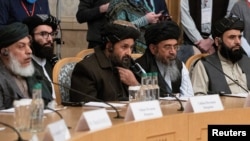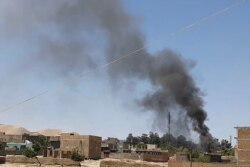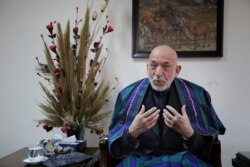Pakistan is set to host prominent Afghan political leaders at a conference in a bid to speed up the intra-Afghan peace process as the U.S.-led foreign military withdrawal from the neighboring country nears completion.
The Pakistani diplomatic initiative takes place after Taliban insurgents rapidly made territorial advances by capturing scores of new Afghan districts across the war-torn country since early May, when U.S. and NATO allied troops formally began the withdrawal process.
The ensuing security deterioration has fueled fears the vacuum left by the departure of foreign troops could turn the conflict into a full-blown civil war and enable transnational terrorist groups to find more space on Afghan soil to attack their respective targets in neighboring countries and beyond.
Highly placed official sources in Islamabad told VOA on Wednesday the proposed conference is scheduled for “17 to 19 July” and several Afghan leaders have already confirmed their participation.
Afghan special presidential envoy for Pakistan Mohammed Umer Daudzai and former finance minister Omar Zakhilwal have both confirmed to VOA they will attend the meeting. However, Daudzai, said the meeting “dates are still being debated.”
Hamid Karzai, a former Afghan president, Salahuddin Rabbani, a former foreign minister, Omar Zakhilwal, a former finance minister, Haji Mohammad Mohaqiq, a senior leader of ethnic Hazara minority community, Gulbuddin Hekmatyar, a former warlord-turned politician, and Ahmad Wali Masoud, are among the invitees, the sources said.
Islamabad has proposed to arrange the meeting as months of slow-moving, U.S.-brokered peace negotiations between the Taliban and Afghan government representatives have not met with any success.
Many of the leaders invited to the the Islamabad meeting are also expected to travel to Doha, Qatar, under the leadership of the head of Afghanistan’s national reconciliation council, Abdullah Abdullah, to discuss with Taliban leaders ways to advance the peace process.
Pakistani officials say regional countries are worried and collectively making efforts to press warring Afghans to negotiate an “inclusive political settlement” to prevent the situation from spiraling out of control.
Mansoor Khan, Pakistan’s ambassador to Afghanistan, says his country has maintained across the board engagement with all Afghan stakeholders relevant to the peace process, including the Kabul government and the Taliban.
“We are constructively engaged to use all our influence in a positive manner. But we cannot and we should not be prescribing a solution for Afghanistan,” Khan stressed while speaking to VOA from Kabul earlier this week.
“The responsibility of agreeing on a sustainable future negotiated internal political settlement is of Afghans themselves,” the Pakistani envoy said.
He emphasized that sustaining the Afghan peace process would become more challenging if the escalation of the conflict phase is prolonged.
“If this instability continues, there is an apprehension of mass movements or influx of refugees into the neighboring countries,” Khan said.
Pakistan still hosts nearly three million Afghan refugees fleeing decades of conflict, persecution and poverty in their native country.
Neighboring Iran also hosts fewer than a million Afghan refugees.
Despite the escalation in violence, Ambassador Khan said he was “optimistic” a political settlement could be reached among Afghan parities to the conflict.
Learning from the past experience of what happened in the 1990s, he insisted, all domestic and external stakeholders, including the United States, have promised to “invest heavily and constructively” in the current peace process.
“The encouraging thing is that all Afghan stakeholders are on the table, all neighboring countries are supporting the peace efforts and the international community wants to assist Afghanistan in bringing an end to more than four decades of conflict and in moving towards an era of peace and stability,” Khan said
The Taliban took control of Afghanistan after emerging victorious in the civil war of the 1990s. The fundamentalist group took power in Kabul in 1996 and ruled the country until late 2001, when the U.S.-led foreign military invasion took place for harboring leaders of the al-Qaida terrorist network.
Only three countries, Pakistan, Saudi Arabia and the United Arab Emirate, had recognized the Taliban government, while the rest of the global community refused to do so, citing the controversial governance and the group’s links with terrorists.
However, after being ousted from power, the Taliban has been waging a violent insurgency against the U.S.-backed Afghan government and has since taken control or extended insurgent influence to more than half of Afghanistan.
The American withdrawal is an outcome of an agreement Washington signed with the Taliban signed in February 2020.
Pakistan played a key role in arranging and facilitating the U.S.-Taliban deal but allegations that insurgent leaders use Pakistani soil to direct attacks in Afghanistan remain at the center of Kabul’s diplomatic tensions with Islamabad.









